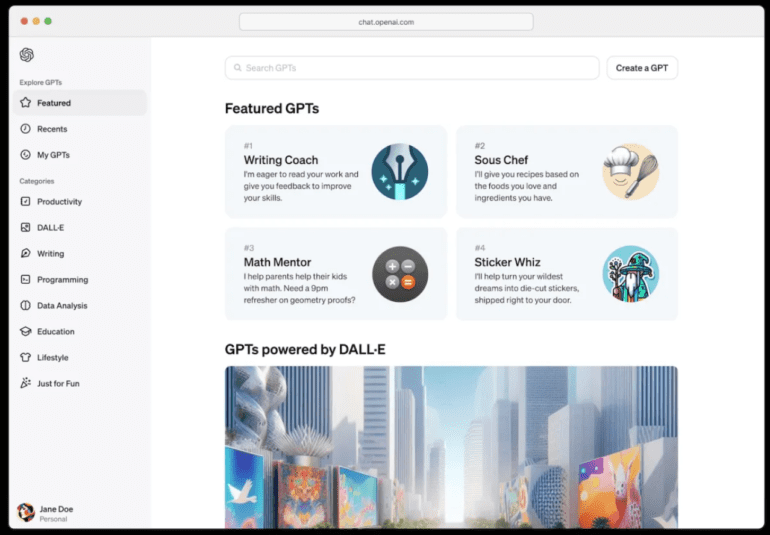TL;DR:
- OpenAI introduces GPTs, allowing users to create customized conversational AI models.
- GPTs can be developed without coding experience and cater to a wide range of applications.
- A GPT Store marketplace will enable users to publish and potentially monetize their GPT models.
- OpenAI plans to reward creators with a portion of the revenue generated from popular and useful GPTs.
- The platform’s move resembles the App Store model, potentially disrupting the AI market.
- OpenAI’s independence could bring it into competition with industry giants like Apple and Microsoft.
Main AI News:
In the burgeoning landscape of AI innovation, OpenAI has unleashed a game-changer: GPTs, an avenue for individuals to craft their own rendition of the widely acclaimed conversational AI, ChatGPT. Beyond the realm of mere creation, this development invites enthusiasts and entrepreneurs to showcase their bespoke GPTs on the burgeoning GPT Store marketplace, with the tantalizing prospect of reaping financial rewards.
This unveiling occurred amidst a wave of announcements during OpenAI’s inaugural developer day in San Francisco. It signifies a notable shift in the AI market’s dynamics, one that embraces a more hands-off approach. Historically dominated by a select few versatile AI systems, the landscape is evolving to encourage external ingenuity. OpenAI appears to have taken a page from Apple’s playbook, recognizing that facilitating the innovation of others can be as valuable as pioneering it themselves.
In the words of founder and CEO Sam Altman, “We believe if you give people the tools, they will do amazing things.” The focal point here is GPTs, which are essentially custom versions of ChatGPT crafted for specific purposes. The beauty of it lies in its accessibility, as coding expertise is not a prerequisite. GPTs can range from simple to intricate, tailored to individual preferences and requirements.
Imagine a GPT trained on your recipe collection, effortlessly providing ingredient lists for your favorite soup. Alternatively, you could have one well-versed in the intricacies of a sprawling fantasy series, ready to answer your queries about characters like Sir Roderick Random. For the more serious-minded, businesses can develop GPTs trained on proprietary code, facilitating code style checks or generating cohesive code segments.
Creating a GPT is as straightforward as conversing with ChatGPT and articulating your desires. Altman demonstrated this live, instructing ChatGPT to fashion a startup advice bot and fine-tuning its output with an uploaded lecture for brevity and constructiveness. The result? A ready-to-go AI companion.
Beyond internal capabilities, GPTs can integrate external services, such as translation APIs. Users, however, maintain control over the handling of their data, ensuring privacy and security.
Drawing inspiration from Apple’s App Store model, OpenAI is positioning GPTs for both development and promotion within their ecosystem. Altman revealed, “We’re going to pay people who make the most used and most useful GPTs with a portion of our revenue.” While the specifics of monetization remain under development, initial plans include revenue sharing, with potential future options for individual GPT subscriptions.
The concept of “verified builders” may emerge as a safeguard against low-quality or deceptive offerings, but early examples from Code.org, TripAdvisor, and Canva suggest a focus on more official applications rather than individual experiments.
OpenAI’s ambitions are lofty, and this move positions them as a standalone platform, potentially in competition with industry giants like Apple and Microsoft. Potential conflicts may arise, particularly in terms of monetizing GPT models outside established app store frameworks. As Microsoft delves into Copilot models tailored for tasks like Office tools, it remains to be seen how GPTs will navigate the intricate web of industry dynamics.
While the partnership between OpenAI and Microsoft has been celebrated, the future of their collaboration remains uncertain. These next few years promise to be intriguing as the AI landscape continues to evolve and adapt.
Conclusion:
OpenAI’s GPT Store initiative signals a significant shift in the AI market, encouraging external innovation and customization. The move toward rewarding creators and establishing a marketplace model has the potential to challenge established industry players, such as Apple and Microsoft, and shape the future of AI development and distribution.

